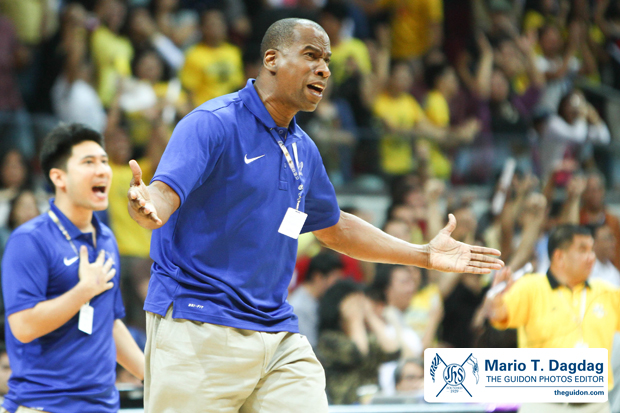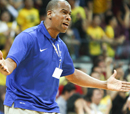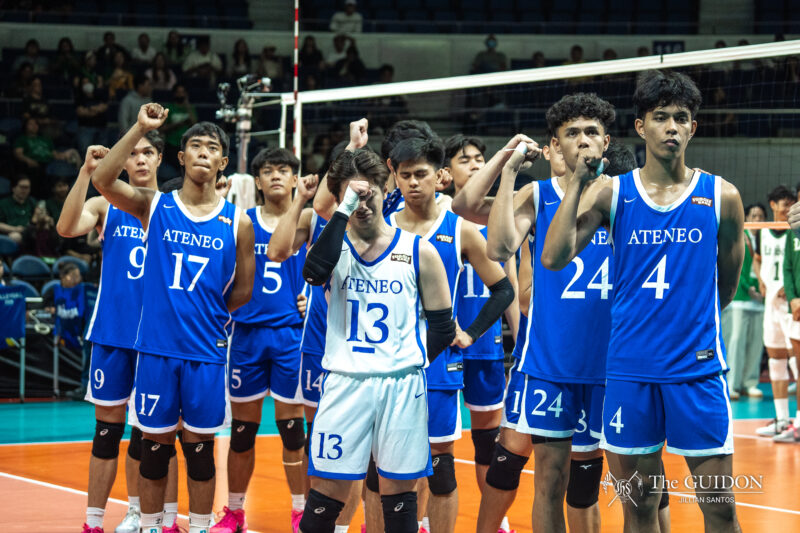
MR. 100 PERCENT. Norman Black not only leaves behind a glorious eight-year run, but also an unparalleled legacy as the 35th head coach of the Ateneo Blue Eagles. Photo by Mario T. Dagdag.
WHEN THE final buzzer sounded in Game Two of the UAAP Season 75 Men’s Basketball Finals, the Ateneo Blue Eagles became the first to garner five straight championships in the Final Four era.
Amidst all that has come and gone over the past eight years, there has been one constant element in what can be considered as Ateneo’s Golden Age in collegiate basketball: Norman Augustus Black.
His tenure as head coach was an era that will be cast in stone as the glory days of the Blue and White. His unparalleled success and impact on the lives of his players can be likened to John Wooden, one of the greatest coaches in American basketball history.
Black has a total of 16 titles from the UAAP, the University Games, the FilOil Premier Cup, the Nike Summer League and the Fr. Martin Cup. He has a 110-26 win-loss record in collegiate basketball to make a whopping 80.88 winning percentage. Behind the wins and trophies, however, is a man who has graced the Ateneo community with his example and legacy.
His brand of basketball
Black was brought into the Blue Eagles as team consultant in 2004 and was hired as the team’s 35th head coach the following year. It was his first venture into coaching in the collegiate ranks, having coached in the PBA where he led the San Miguel Beermen to nine titles and a Grand Slam from 1987 to 1996.
Black’s first years were growing pains for the Blue Eagles before they became champs in Season 71—Ateneo’s first title since 2002. In Season 68 and 71, Ateneo was eliminated by La Salle in the Final Four. In Season 69, everyone remembers how Ateneo reached the finals but was eliminated in a three-game series by the UST Growling Tigers, led by then first-year coach Pido Jarencio. In fact, so many in the Ateneo community expressed much disappointment at Black’s performance then that they wanted him out.
“He came in here with a plan,” said Blue Eagles Team Manager Paolo Trillo. “It was not easy to just come into a basketball program and turn things around.”
The first thing Black paid attention to was recruitment. “We wanted to give opportunities to those players who wanted not only to play basketball, but also to study in Ateneo,” said Black, who scouted the provinces to tap potential talent.
“We really built networks all around the country,” Trillo added.
Products of Black’s extensive recruitment from the province were talents such as Greg Slaughter, Nonoy Baclao, Emman Monfort, JP Erram and Oping Sumalinog.
Discipline won championships
A banner with the phrase “Defense Wins Championships” looms over the basketball court of the Moro Lorenzo Sports Center (MLSC). More than a banner, though, it embodies Black’s coaching philosophy: discipline.
It was hard-nosed defense that helped the five straight championships come to fruition—something that has come about due to the discipline that Black inculcated in his players. “He instilled hard work and discipline—just changing the work ethic of all these guys,” said Trillo. Every minute of practice was precious and every member of the team and coaching staff was dead focused. It was an atmosphere that exuded the highest form of respect.
“Through my years under Coach Norman’s leadership, I’ve tried to emulate his work ethic that is truly remarkable,” shared Chris Tiu. “I’ve always admired his professionalism and poise under pressure.”
A father figure
Like a parent who wants the best for his child, Black watched out for his players off the court. “He’s like a father figure to the boys,” Trillo said.
Akin to the film Coach Carter, Black monitored how his players performed in the classroom. “How are your grades?” he casually asked some of his players during an interview with The GUIDON at the start of summer training camp. Subtle yet forthright—that was how Black went about with his business.
Black not once shouted at or expressed ire at his players. When a player would commit errors in games or in practices, Black would guide his pupil on how performance could be improved.
Often seen as the stoic figure on the sidelines, Black has endeared himself to those around him. “Different coaches can come in here, and set their systems in place,” commented Trillo, “but what we’ll miss most about Coach Norman is him just really being here, being one of the boys, just hanging out. Being a friend to everyone. And personally, he was like a best friend.”
In addition, his players do not just see him as a basketball coach. “Coach Norman is more than just a coach—he’s a life coach,” shared Kiefer Ravena.
“Coach Norman is a dad away from home to me. I’ve been with him for five years,” shared back-to-back Finals Most Valuable Player Nico Salva. “It’s inspiring to see a man who has achieved so much in his life and yet be so humble.”
A man of character
Aside from honing his players’ skills, Black also built character. “I think that’s one trademark of Coach Norman,” said Trillo. “He teaches lessons in life, things that the players can take with them after their basketball careers. He’s really a special coach in that aspect.”
One admirable element in Black’s coaching philosophy is his “No yabang” policy, something he consistently reminded his boys of before and after every game—particularly in the finals. Humility was something Black really tried to instill in the locker room, always telling his boys, “You’re only as good as your last game.” Salva shared. “I keep that in mind and it makes me play hard all the time.”
“Coach Norman was very good at keeping the team humble,” added Trillo. “It made us respect our opponents and made us work even harder all the time. That staying grounded has really pushed the team to strive and become better.”
A particular anecdote clearly illustrates this trait. “Back in the dying seconds in the 2007 knockout loss to La Salle, there was a timeout, there was taunting,” shared noted sports blogger Rick Olivares. “Eric Salamat went up to Coach Norman and asked for permission to punch one of the Archers who had been trash talking him. ‘No, we don’t do that here. It’s okay,’ Coach said.”
Olivares recalled another anecdote, this time from before the 2008 finals. The players gave him a tribute when they all wore shirts bearing the number 24 during the warm-up. “When he came out of the dugout, he initially just caught a glimpse,” Olivares said, “but when the players turned around, he understood what it meant—24 was his number. Chris Tiu asked him what he thought, but Coach ignored him, and did not mind him until they won the championship. When they did, Chris asked Coach why he did not mind him then, and he replied, ‘You know, Chris, I was about to cry.’”
Although his leadership will be missed on the hardwood floors, his mere presence will be missed even more. “Another quality that he brought to the community is being such a class act,” shared Tiu. “I am truly grateful and honored to have been trained under his wing.”
Parting ways
On February 18, University President Fr. Jose Ramon Villarin released a memo officially announcing that Black would be coaching his final year in Season 75. “It’s going to be very emotional, especially when the season ends,” said Black in an exclusive interview with The GUIDON last February.
October was a bittersweet month for the Ateneo community. Although the five-peat dream came true, the idea of waking up to the reality of Ateneo and Black parting ways elicited much emotion.
“Of course we’re sad,” said Von Pessumal, “but it’s a process. We have to move on.”
“It’s saddening,” added Ravena, “but it’s a new chapter in his life, we have to be happy for him.”
“What I would like to be remembered for as coach of Ateneo is basically building a foundation for a successful program,” said Black in his final UAAP press conference shortly after winning the title.
The traditional victory bonfire held at the Ateneo Grade School parking lot on October 13 was indeed emotional, but was held in a spirit of commemoration and thanksgiving. “The past eight years have been one of the happiest experiences in my coaching career,” said Black.
The Ateneo community was a witness to a phenomenon that may never happen again in the history of collegiate basketball in the Ateneo. And it was all thanks to the legend—to Black—who gave his heart for the Blue and White.
With reports from Margarita A. Contreras and Mateo L. Escueta







